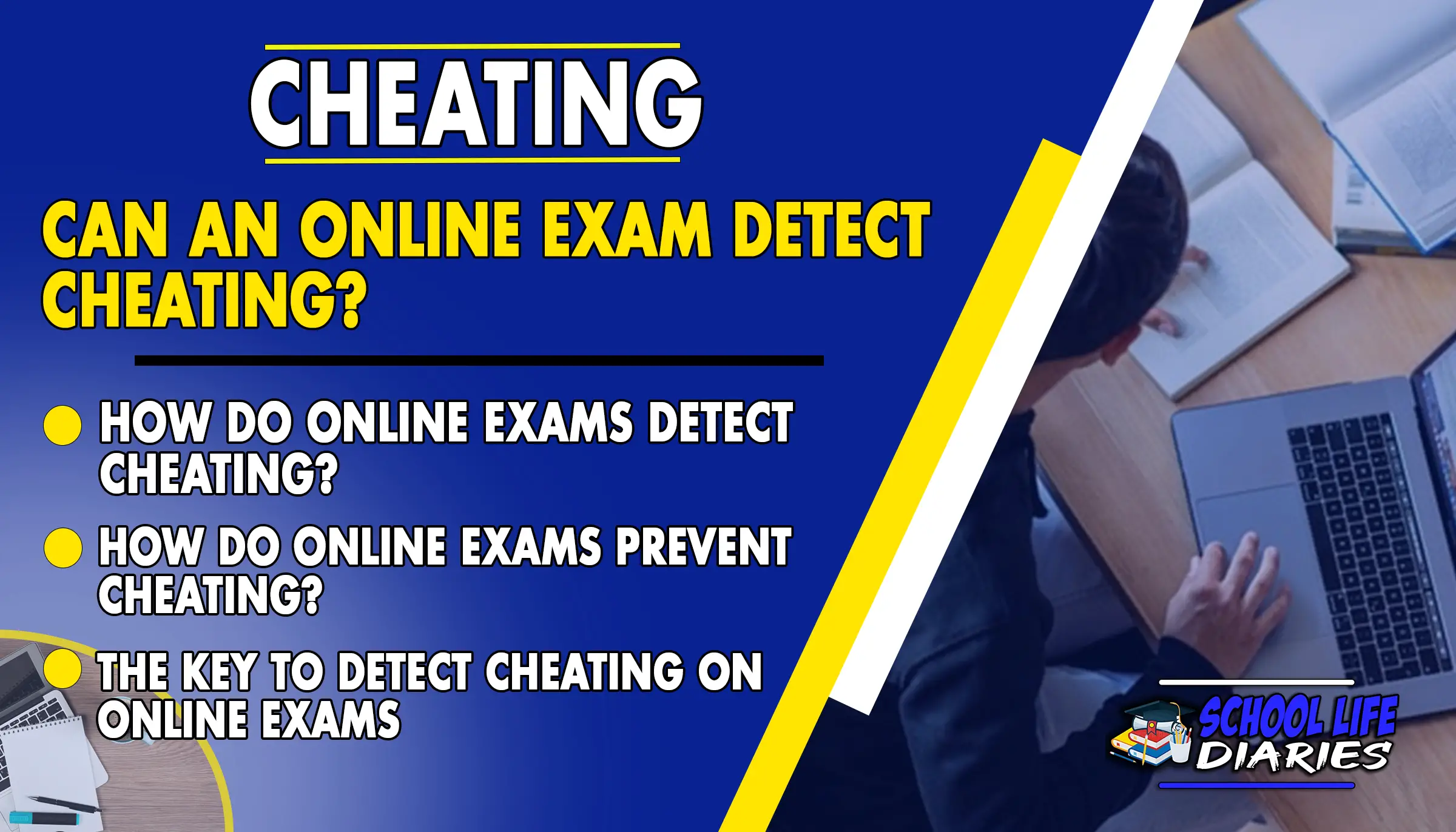Yes, online exams detect cheating through a variety of methods, including plagiarism, detection software, or webcam monitoring. Cheating can also be detected by looking at patterns of answers, such as incorrect answers that are similar across multiple students.
There are a few ways to cheat on an online exam. The most common is copying and pasting answers from the Internet or from other sources. Cheating can also be done by sharing answers with other students or by using unauthorized aids, such as cheat sheets.
How Do Online Exams Detect Cheating?
Online exams have become an increasingly popular way to assess students’ knowledge. They are convenient for both the instructor and the student and can be taken from anywhere in the world.
However, there is concern that online exams can be cheated. Here are three ways online exams detect cheating:
1) Proctoring Software:
Proctoring software is a type of monitoring software that can be used to detect cheating on online exams. It works by recording the exam taker’s webcam and microphone, as well as their screen activity. If the proctoring software detects any suspicious activity, it will alert the instructor.
2) Monitoring Webcams and Microphones:
Monitoring webcams and microphones is another way to detect cheating on online exams. The instructor can use this monitoring to listen in on the exam taker’s conversation and watch their activity.
3) Screen Monitor and Recording Activities:
Screen monitoring and recording activities are ways to detect cheating on online exams. This type of monitoring allows the instructor to see what the exam taker is doing on their screen. If they see anything suspicious, they can investigate further.
What Types of Online Cheating Should You Be Worried About?
There are different types of online cheating that you should be worried about. Some of the most common types of online cheating include:
- Cheating on a test or homework assignment.
- Sharing answers or working together on assignments.
- Copying someone else’s work and passing it off as your own.
- Posting fake information or plagiarising content.
- Misusing social media to communicate with other students about schoolwork.
- Cheating in a game or contest is done by using unauthorized help or resources.
- Falsifying data or results in a research project.
- Using someone else’s identity to access their accounts or complete assignments.
The Facts About Cheating on Online Tests
Cheating on online tests is a big problem. In fact, it’s so big that some people think it’s the reason why so many students are struggling in school today. There are a lot of different ways to cheat on an online test, but the most popular methods are using cheat sheets and sharing answers with other students.
Cheating can get you into a lot of trouble. Not only can you get a bad grade on the test, but you can also get in trouble with your teacher or professor. You may even get expelled from school if you’re caught cheating. So if you’re planning to cheat on an online test, think again. It’s not worth the risk.
What is Considered Cheating on an Online Exam?
Cheating in an online exam can take many different forms. Some of the most common types of cheating include copying another person’s work, using unauthorized assistance, and falsifying information. All of these activities can lead to a student being disqualified from the exam and may also result in disciplinary action from the school.
There are also laws that govern cheating on online exams. In most cases, these laws are based on the same principles as traditional cheating laws. For example, copying another person’s work is generally considered to be cheating, and using unauthorized assistance may also be illegal.
How Do Online Exams Prevent Cheating?

There are many reasons why online exams have become a popular choice for educators and students alike. One of the main advantages of online exams is that they prevent cheating. Let’s take a closer look at how online exams achieve this goal and some of the other benefits they offer.
Online ID Authentication:
One of the simplest and most effective ways to prevent cheating on online exams is by using verified IDs. This means that you must enter your real name and date of birth (or other identifying information) before taking the test.
Secure Web Browsers:
The way to prevent cheating on online exams is by using browsers that have been specifically designed for secure testing. These browsers often have features that restrict access to certain websites and documents, and also prevent students from accessing information they shouldn’t be seeing during the exam.
Auto-proctoring:
If you’re worried about someone trying to take the exam for you, auto-proctoring may be a good solution. This feature uses software to automatically monitor students’ screens and track their activity during the test. If anything suspicious happens, like someone trying to access forbidden websites, the software will automatically pause the test and notify the proctor.
Password Protection:
Many online exams require students to enter a password before beginning the test. This ensures that only those who are supposed to be taking the exam can start it, and it also helps keep unauthorized users from viewing or tampering with it.
Secure Online Testing Environments:
When it comes to online exams, security is of the utmost importance. That’s why many testing environments are now moving to secure, cloud-based platforms. These platforms offer a number of advantages, including increased security, scalability, and flexibility.
Read Another Article: DO I NEED A LAPTOP FOR COLLEGE?
The Key to Detect Cheating on Online Exams
The key to detecting cheating on online exams is to look for patterns in the answers. If a student is consistently getting the wrong answer to the same question, or if they are copying and pasting the same response over and over again, then there is a good chance that they are cheating.
Another clue that someone may be cheating is if they are using a forbidden resource like a calculator or the internet. If you suspect that someone is cheating, it is best to report it to your professor.
How Do Universities Detect Online Cheating?
Universities have a variety of methods for detecting online cheating. One common method is to compare students’ work against one another to look for similarities. This can be done manually or by using software that compares essays electronically.
Another method is to track students’ internet activity to see if they are visiting unauthorized websites or communicating with unauthorized people during exams.
How Do Online Exams Detect Cheating by Using Biometrics?
Online exams are increasingly using biometrics to detect cheating. This is done by scanning the irises of test takers to match them against a previously registered image. If the scan does not match, the test taker is likely cheating.
The way that biometrics is used to detect cheating is by recording the test taker’s voice. This can be done through a microphone that is built into the computer or by having the test taker wear a headset. The recorded voice is then compared to the test taker’s voiceprint, which is stored in a database. If the voices do not match, the test taker is likely cheating.
How Do Online Exams Use Logins To Detect Cheating?
Online exams use logins to detect cheating in a few ways:
- Using login tracking software:
This software logs when each user logs in and out of the exam. If there is suspicious activity, such as someone logging in from multiple locations or at odd times, the software will flag this as cheating.
- Using proctoring software:
This software monitors the exam for any unusual login activity or someone typing too fast or taking too many notes. If anything suspicious is detected, the software will mark this as cheating.
How Do Online Exams Use Voice Monitoring To Detect Cheating?
Online exams use voice monitoring to detect cheating by recording students’ voices during the test and comparing them to a previously recorded voice sample. If the two recordings match, it is likely that the student was cheating.
How Do Online Exams Use Browser Monitoring To Detect Cheating?
Browser monitoring is used to detect cheating in online exams by tracking the user’s activity while they are taking the exam. This includes the websites that they visit and the files that they download. If any suspicious activity is detected, the exam will be flagged and the student will be notified.
How Do Online Exams Detect Cheating by Using Webcams?
Webcams are becoming more and more common in online exams as they are a great way to detect cheating. Most webcams have built-in software that can detect when someone is trying to cheat by looking at the screen of another student.
There are a few things you can do to make sure that your webcam is working properly for online exams. Second, make sure that the webcam is positioned so that it has a clear view of your entire face. If the webcam is blocked by anything, it may not be able to properly detect cheating.
How Do Online Exams Use Proctor Software To Stop Plagiarism?
Plagiarism is a form of cheating that can occur when students turn in work that is not their own. Sometimes students may copy text from another source without giving credit to the original author. This can be considered plagiarism, and it is a violation of most academic honor codes.
One way to prevent plagiarism is to use proctor software. Proctor software is software that can be used to check for plagiarism. It can scan papers for text that has been copied from other sources, and it can also check for similarities between papers. If any similarities are found, the proctoring software will mark them as being plagiarized.
How Do Online Exams Stop Test Material From Being Leaked?
One way that online exams stop test material from being leaked is by encrypting the data so that it can only be accessed by those who are authorized to do so. This helps to ensure that the test material is not released prematurely and that the exam process is fair for all students.
Online exams can often be timed so that once the exam begins, it cannot be paused or stopped. This helps to prevent people from sharing the exam content with others who did not take the exam. By using a variety of security measures, online exams can help to keep the test material confidential and prevent it from being leaked.
How Do Online Exams Stop Students Using Other Devices To Cheat?
One of the main ways that online exams are designed to stop students from cheating is by using a proctoring service. This service will monitor the students’ activities during the exam and will be able to see if they are trying to access other devices or websites. Additionally, many online exams have questions that are specific to the course material and are not found in other exams. This makes it more difficult for students to cheat.
How do Online Tests Detect Switching Tabs?
Online tests can detect switching tabs. Your proctor will be alerted if you open a new tab, and they may ask you why you did so.
In general, it’s best to avoid switching tabs during an online test, as it can be seen as suspicious behavior. The browser will interpret a student’s attempt to switch tabs as a cheating attempt. Because of this, online exams must be able to detect when you switch tabs. The action may be restricted by the proctoring software or flagged.
Conclusion: Online Exams Detect Cheating
It is now becoming more difficult to cheat on online exams thanks to the use of sophisticated detection software. Many different methods are used to try and detect cheating, including detecting unusual patterns of behavior, checking for similarities in answers, and identifying proxy servers. While no system is perfect, these measures have helped to reduce the amount of cheating that takes place on online exams.




